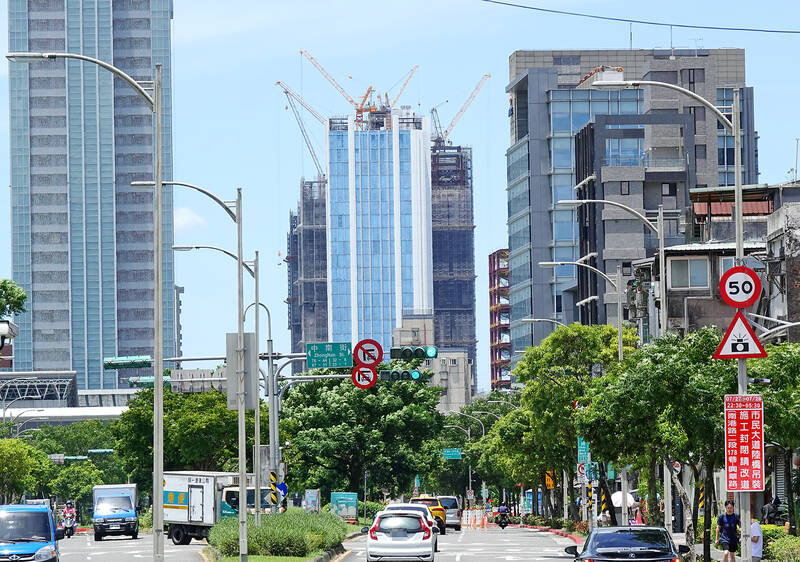Taiwan’s major property brokers yesterday reported a mild increase in housing deals this month, attributable mainly to the government’s introduction of preferential lending terms for first-home purchases.
Sinyi Realty Inc (信義房屋), Taiwan’s only listed broker, said the housing market’s performance this month was similar to July and last month, but gained 10 percent by volume compared with last year.
Singyi research manager Tseng Ching-der (曾敬德) attributed the year-on-year pickup to a low base last year.

Photo: CNA
“The third quarter proved not bad this time around, supported by real demand,” Tseng said, adding that people responded positively to the government’s introduction of ultra-low interest rates of 1.775 percent for first-home purchases.
The favorable lending terms also include a five-year grace period, a loan cap of NT$10 million (US$309,904) and mortgage periods of up to 30 years, significantly lowering the threshold for home ownership, Tseng said.
Specifically, houses priced from NT$10 million to NT$15 million gained noticeable popularity, accounting for 25 percent of deals, the analyst said.
Apartments valued between NT$30 million and NT$50 million in Taipei were also well received, whereas houses of NT$10 million to NT$20 million were the mainstream in New Taipei City, Tseng said.
Evertrust Rehouse Co (永慶房屋), Taiwan’s largest broker by number of offices, said it observed a small increase in housing deals across Taiwan, as people grew accustomed to policy measures the government adopted to cool the market.
The absence of new credit controls made by the central bank on Thursday last week allowed people to breathe a sigh of relief and speed up purchasing plans, Evertrust Rehouse deputy research head Chen Chin-ping (陳金萍) said.
People with relocation and asset allocation needs also took action after housing prices failed to show corrections for several quarters, Chen said.
H&B Realty Co (住商不動產), the nation’s top broker by number of franchises, said the market displayed better visibility compared with the two previous months and preferential lending terms played an encouraging role.
This was most evident for the two-bedroom apartments in northern and southern Taiwan, H&B Realty research chief Jessica Hsu (徐佳馨) said, adding that offices with rental prospects also received close attention.
Great Home Realty Co (大家房屋) said it did not detect cautious sentiment thus far, though the presidential and legislative elections are drawing near.
It is too early to conclude that political uncertainty does not matter at this time, Great Home head researcher Mandy Lang (郎美囡) said.

Taiwan will prioritize the development of silicon photonics by taking advantage of its strength in the semiconductor industry to build another shield to protect the local economy, National Development Council (NDC) Minister Paul Liu (劉鏡清) said yesterday. Speaking at a meeting of the legislature’s Economics Committee, Liu said Taiwan already has the artificial intelligence (AI) industry as a shield, after the semiconductor industry, to safeguard the country, and is looking at new unique fields to build more economic shields. While Taiwan will further strengthen its existing shields, over the longer term, the country is determined to focus on such potential segments as

UNCERTAINTY: Innolux activated a stringent supply chain management mechanism, as it did during the COVID-19 pandemic, to ensure optimal inventory levels for customers Flat-panel display makers AUO Corp (友達) and Innolux Corp (群創) yesterday said that about 12 to 20 percent of their display business is at risk of potential US tariffs and that they would relocate production or shipment destinations to mitigate the levies’ effects. US tariffs would have a direct impact of US$200 million on AUO’s revenue, company chairman Paul Peng (彭雙浪) told reporters on the sidelines of the Touch Taiwan trade show in Taipei yesterday. That would make up about 12 percent of the company’s overall revenue. To cope with the tariff uncertainty, AUO plans to allocate its production to manufacturing facilities in

COLLABORATION: Given Taiwan’s key position in global supply chains, the US firm is discussing strategies with local partners and clients to deal with global uncertainties Advanced Micro Devices Inc (AMD) yesterday said it is meeting with local ecosystem partners, including Taiwan Semiconductor Manufacturing Co (TSMC, 台積電), to discuss strategies, including long-term manufacturing, to navigate uncertainties such as US tariffs, as Taiwan occupies an important position in global supply chains. AMD chief executive officer Lisa Su (蘇姿丰) told reporters that Taiwan is an important part of the chip designer’s ecosystem and she is discussing with partners and customers in Taiwan to forge strong collaborations on different areas during this critical period. AMD has just become the first artificial-intelligence (AI) server chip customer of TSMC to utilize its advanced

Chizuko Kimura has become the first female sushi chef in the world to win a Michelin star, fulfilling a promise she made to her dying husband to continue his legacy. The 54-year-old Japanese chef regained the Michelin star her late husband, Shunei Kimura, won three years ago for their Sushi Shunei restaurant in Paris. For Shunei Kimura, the star was a dream come true. However, the joy was short-lived. He died from cancer just three months later in June 2022. He was 65. The following year, the restaurant in the heart of Montmartre lost its star rating. Chizuko Kimura insisted that the new star is still down